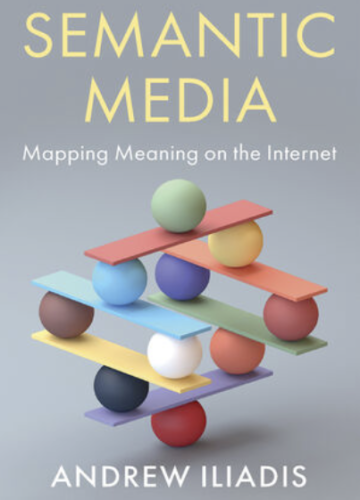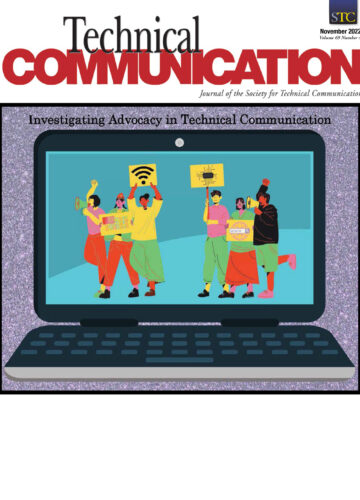Publications
Books, articles, and reports published by Digital Life Institute members.
Semantic Media: Mapping Meaning on the Internet
Andrew Iliadis
Book: Media technologies now provide facts, answers, and “knowledge” to people – search engines, apps, and virtual assistants increasingly articulate responses rather than direct people to other sources. Semantic Media is about this emerging era of meaning-making technologies. Companies like Apple, Google, Facebook, Amazon, and Microsoft organize information in new media products that seek to “intuitively” grasp what people want to know and the actions they want to take. This book describes some of the insidious technological practices through which organizations achieve this while addressing the changing contexts of internet searches, and examines the social and political consequences of what happens when large companies become primary sources of information.
Access HereVisualizing the datasphere: Representations of old bodies and their data in promotional images of smart sensor technologies for aging at home
Kirsten L. Ellison, Wendy Martin, Isabel Pedersen, and Barbara L. Marshall
Journal Article: Technologies for people aging at home are increasingly prevalent and include ambient monitoring devices that work together with wearables to remotely track and monitor older adults’ biometric data and activities of daily living. Our paper examines the ways in which the datafication of aging is offered up visually by technology companies to promote their products. Specifically, we ask: how are data visualized in promotional images of smart sensor technologies for aging at home? And in these visualizations, what happens to the aging body and relations of care? We present 3 themes on the visual representation of old bodies and their data: (1) Captured Data, (2) Spatialized Data, and (3) Networked Data. Each, we argue, contribute to a broader visualization of the “datasphere”. We conclude by highlighting the underlying assumptions of old bodies in the co-constitution of aging and technologies in which the fleshy and lived corporeality of bodies is more often lost, reduced to data points and automated care scenarios, and further disentangled from other bodies, contexts and things.
Access HereWriting Infrastructure with The Fabric of Digital Life Platform
Katlynne Davis, Danielle Mollie Stambler, Jessica Lynn Campbell, Daniel L. Hocutt, Ann Hill Duin, and Isabel Pedersen
Journal Article: Teaching writing involves helping students develop as critical communicators who use writing to question often-unseen systems of power enabled by infrastructures, including digital spaces and technologies. This article uses Walton, Moore, and Jones’ (2019) 3Ps Framework—positionality, privilege, and power—to explore how, through assignments we developed incorporating the Fabric of Digital Life digital archive, instructors can make visible to students the invisible layers of infrastructure. Using the 3Ps framework, we illustrate how our pedagogical approach encourages students to use writing to interrogate digital infrastructure and the ways it is entangled with positionality, privilege, and power. Communication Design Quarterly.
Access HereCrime, Punishment, and Video Games
Kristine Levan and Steven Downing
Book: Moving beyond discussions of potential linkages between violence and video games, Crime, Punishment, and Video Games examines a broad range of issues related to the representation of crime and deviance within video games and the video game subculture. The context of justice is discussed with respect to traditional criminal justice agencies, but also expanded throughout to include issues related to social justice. The text also presents the potential cultural, social, and economic impact of video games. Considering the significant number of video game players, from casual to competitive players, these issues have become even more salient in recent years. Regardless of whether someone considers themselves a gamer, video games are undoubtedly relevant to modern society, and this text discusses how the shift in gaming has impacted our perceptions of deviance, crime, and justice. The authors explore past, present and future manifestations of these connections, considering how the game industry, policy makers, and researchers can work toward a better understanding of how and why video games are an important area of study for criminologists and sociologists, and how games will present new promises and challenges in the years to come.
Access HereLocalizing Content: The Roles of Technical & Professional Communicators and Machine Learning in Personalized Chatbot
Daniel Hocutt, Nupoor Ranade, and Gustav Verhulsdonck
Journal Article: This exploratory case study of an artificial intelligence (AI)-driven chatbot demonstrates that microcontent, a snippet of personalized content that responds to users’ needs, is a form of localization reliant on a content ecology. In contributing to users’ localized experiences, technical communicators should recognize their work as part of an assemblage in which users, content, and metrics augment each other to produce personalized content that can be consumed by and delivered through AI-assisted technology. We conclude that technical communicators should teach, research, and practice competencies and skills to advocate for localized users in assemblages of user, content, metrics, and AI. Society for Technical Communication, Volume 69, Number 4
Access HereThe seer and the seen: Surveying Palantir’s surveillance platform
Andrew Iliadis, Amelia Acker
Journal Article (in The Information Society): Palantir is among the most secretive and understudied surveillance firms globally. The company supplies information technology solutions for data integration and tracking to police and government agencies, humanitarian organizations, and corporations. To illuminate and learn more about Palantir’s opaque surveillance practices, we begin by sketching Palantir’s company history and contract network, followed by an explanation of key terms associated with Palantir’s technology area and a description of the firm’s platform ecosystem. We then summarize current scholarship on Palantir’s continuing role in policing, intelligence, and security operations. Our primary contribution and analysis are a computational topic modeling of Palantir’s surveillance patents (n = 155), including their topics and themes. We end by discussing the concept of infrastructuring to understand Palantir as a surveillance platform, where we theorize information standards like administrative metadata as phenomena for structuring social worlds in and through access to digital information.
Access Here
Where is the AI? Educator perspectives
Lesley Wilton, Stephen Ip, Merra Sharma, Frank Fan
Conference Paper: to be presented at 23rd International Conference on Artificial Intelligence in Education, 27-31 July, Durham University, UK
Working Alongside Non-Human Agents
Ann Hill Duin, Isabel Pedersen
Conference Paper: From Proceedings of the 2021 IEEE International Professional Communication Conference (ProComm), 2021, pp. 1-5.
Access HereWhat AI? Making a case for AI Literacies for Educators
Lesley Wilton, Stephen Ip, Meera Sharma, & Frank Fan
Conference Paper: presented at 11th Annual SALTISE Conference, June 2022.
Access Here
Student APProval: Building a dynamic reading comprehension program for struggling middle school readers
Lesley Wilton & Sarah Bernholtz
Conference Paper: Paper presented at Canadian Society for the Study of Education (CSSE) Annual Conference (Online).
AI Agents, Humans and Untangling the Marketing of Artificial Intelligence in Learning Environments
Isabel Pedersen, Ann Hill Duin
Conference Paper: This exploratory study identifies the tangling of proposed relationships between human and non-human agents by providing an analysis on how AI technologies are marketed for learning subjects through a critical discourse analysis of corporate advertisements.
From the 55th Hawaii International Conference on System Sciences | 2022
Access HereNot Busy Work! The benefits of new literacies and social practices in online discussion
Lesley Wilton
Book Chapter: In Designing for Meaningful Synchronous and Asynchronous Discussion in Online Courses.
Access Here



